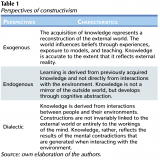Table 1
Constructivism as an approach in educational psychology | El constructivismo como enfoque en la psicología educativa
0 commentsPosted in Artículos | Vol. 8 | Núm. 2 | 2022

| Autor(es) | Luis Ernesto Paz Enrique y María Luisa Leyva Hernández. |
| Contacto | luisernestopazenrique@gmail. com; marialuisa.lh97@gmail.com |
| Tipo de Contribución | Carta al Editor. |
| Referencia | Revista Digital Internacional de Psicología y Ciencia Social Vol. 8, Núm. 2, 2022. |
INTRODUCCIÓN.
Mr. Editor.
Constructivism as a psychopedagogical perspective does not in itself constitute a specific paradigm or theory. This is evident in the published scientific literature where there is no consensus regarding the conceptualization of the constructivist approach. It is based as a referential – explanatory framework in the field of education. It takes as a principle that the subjects of the teaching process build a large part of what they learn and understand. This perspective leaves the authors Piaget and Vygotsky with the theory and research on human development.
The present study focuses on analyzing the perspective raised by the authors Urrutia-Aguilar, Jaimes-Medrano and Aburto-Arciniega (2022) on the resilience of high school teachers. In the study are not analyzed the potentialities of constructivism as a perspective in educational psychology. This would have favored the continuity of the educational teaching process. Consequently, there is a set of paradigms and theories that favor autonomous learning, mainly for high school students.
CUERPO
The constructivist theoretical perspective focuses on analyzing the ways in which knowledge is constructed according to the psychosocial needs and ages of those involved in the teaching-educational process. It is about centering the process on the subjects and on the ways in which they build their learning experiences, rather than on the ways in which it is transmitted or educated. In the opinion of Emery Hyslop-Margison and Johannes Strobel: strictly speaking, constructivism is not a theory but an epistemology or philosophical explanation about the nature of learning (Hyslop-Margison & Strobel, 2008). The above definition is typical of the lack of consensus and inconsistency in terms of constructivism conceptualization (Harlow, Cummings & Aberasturi, 2006; Tunal, Hernández & Paz, 2021).
The starting point of this perspective is that subjects create their own learning (Santiago, 2019). It is argued that there are no absolute truths, so empirical knowledge, discovery and experimentation are used as ways to achieve learning. This assumes that people build knowledge from their individuality, resulting in the perspective of situated teaching or learning. Within constructivism three perspectives are evident, they are observed in Table 1.
Situated learning within dialectical constructivism highlights the importance of social contexts for learning. What is learned is tied to the situation in which the learning occurs and is difficult to apply in new settings. Situated teaching constitutes a challenge for educational practice and psychopedagogical thought as it constitutes a mediation with the cultural context (from the dimensions of everyday life and the professional). Currently, the conception of the teaching-learning process from paradigms focused on instruction have not favored knowledge to be located according to the needs of the participating subjects. The fact of placing the content implies a resizing that starts from the school curriculum to a real life situation.
CONCLUSIONES
The social situation of student development includes the triad school – family – community, therefore the situated perspective allows to dynamize the academic environment where the scholastic paradigm is still reproduced. Likewise, it is argued that it acts as a motivational agent against teaching – learning and social commitment, because they are really actively involved in the construction of their knowledge.
Implementing the situated vision requires coherent, significant and purposeful educational practices that favor increasing the degree of cultural relevance of the activities in which the student participates. For this reason, learning with meaning and above all applicability is essential. As long as students and teachers acquire belonging in a community of practice and reference. Teaching situated within constructivism as a psychopedagogical perspective allows the use of the integrated curriculum where students can acquire knowledge from various areas and disciplines. Following this line of thought, argumentation, for example, can be analyzed from philosophy in discourse analysis, from linguistics and literature in the construction of arguments, from history analyzing texts and speeches, among others.
REFERENCIAS
Harlow, S., Cummings, R., & Aberasturi SM. (2006). Karl Popper and Jean Piaget: a rationale for constructivism. The Educational Forum, 71(4): 41-48. https://eric. ed.gov/?id=EJ796332
Hyslop-Margison, E.J., & Strobel, J. (2008). Constructivism and education: misunderstandings and pedagogical implications. The Teeacher Educator, 43(2):72-86.http://web.ics.purdue.edu/~jstrovel/papers/hyslop_ strovel_2008.pdf
Santiago, M.A. (2019). La enseñanza filosófica en la educación media superior: ¿innovación en pensamiento o volver a los orígenes filosóficos? Daena: International Journal of Good Conscience, 14(1): 80-7. http://www.spentsmexico. org/v12-n1/A6.14(1)80-87.pdf
Tunal, G., Hernández, E.A., & Paz, L.E. (2021). La colateralidad de la enseñanza en línea de los programas en ciencias sociales en México. Pedagogía y Sociedad, 19(7):418-40. http://revistas.uniss.edu.cu/index.php/pedagogia-y- sociedad/article/view/1279
Urrutia-Aguilar, M. E., Jaimes-Medrano, A. L., & Aburto-Arciniega, M. B. (2022). Resiliencia de los docentes de educación media superior durante la pandemia de COVID-19. Revista Digital Internacional de Psicología y Ciencia Social, 8(01), e08012022428. https://doi.org/10.22402/j.rdipycs. unam.e.8.01.2022.428
| Cómo citar:APA7 | Paz Enrique, L. E., & Leyva Hernández, M. L. (2022). El constructivismo como enfoque en la psicología educativa. Revista Digital Internacional De Psicología Y Ciencia Social, 8(2), e08012022428. https://doi.org/10.22402/j.rdipycs.unam.e.8.2.2022.489. |













